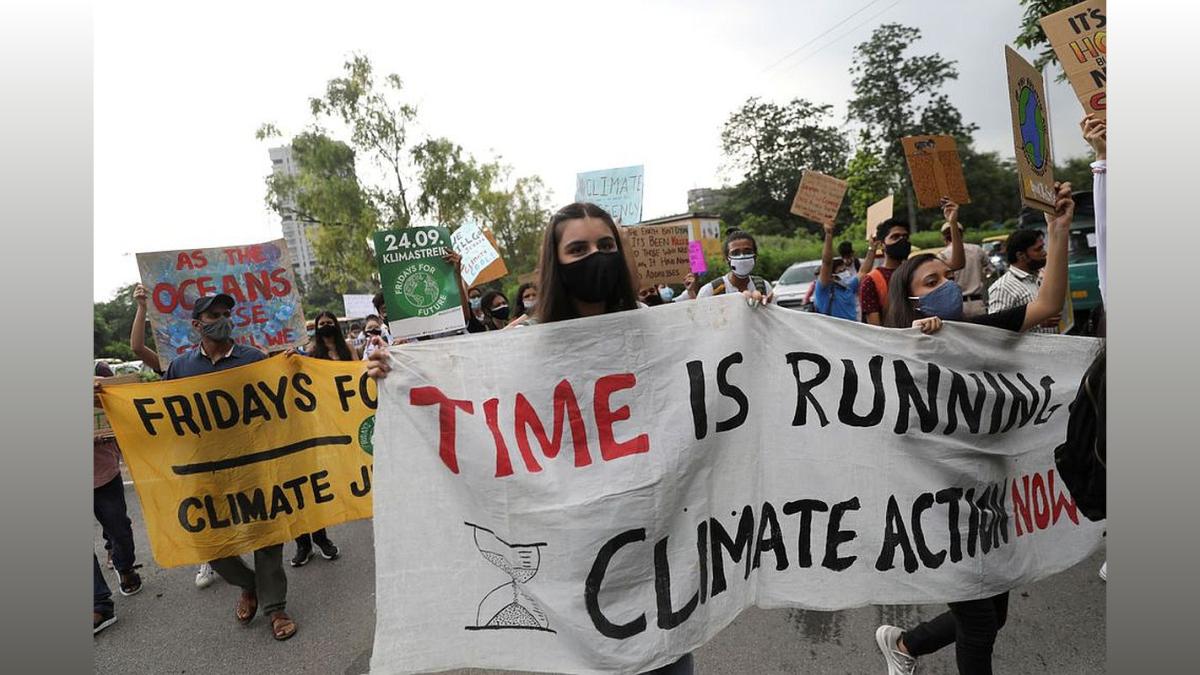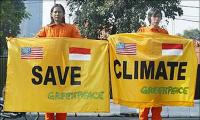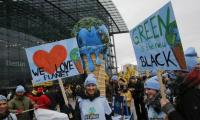COP29 Baku: Finance Deal Key to Climate Action - Former Maldives Prez
Former Maldives President Nasheed warns of tough COP29 negotiations in Baku, emphasizing the need for a new finance goal to break the climate impasse. He calls for a climate damages tax on oil majors and greater financial assistance for vulnerable nations.

New Delhi, Jul 14 (PTI) Negotiations at the UN climate conference in Baku in November are expected to be "extremely challenging", former Maldivian president Mohamed Nasheed has said while emphasizing that an agreement on a new finance goal is central to breaking the political deadlock on climate action.
In an interview with PTI, Nasheed, the Secretary-General of the Climate Vulnerable Forum (CVF), said Azerbaijan's resolve to negotiate commitments upwards at COP29 under its presidency will be tested.
The CVF is a group of developing countries highly vulnerable to climate change. It was founded in November 2009 in the Maldives' capital Male. The forum now comprises 68 countries representing 1.74 billion people.
Nasheed said climate finance is all about responsibility and not aid.
"It involves trillions of dollars, not billions, because the only way for us to truly fight climate change is to invest our way out of it," he said.
Resolving the debate on the New Collective Quantified Goal (NCQG) at COP29 in Baku, Azerbaijan, is central to overcoming the global political climate impasse, he said.
The NCQG is the new amount that developed nations must mobilise annually starting in 2025 to support climate action in developing countries.
At the 2009 UN climate conference in Copenhagen, rich nations pledged to provide USD 100 billion annually from 2020 to help developing countries mitigate and adapt to climate change.
However, delays in achieving this goal have eroded trust between developed and developing nations and have been a continual source of contention during annual climate negotiations.
In May, the Organisation for Economic Co-operation and Development (OECD) claimed that developed countries had met the long-standing USD 100 billion-a-year promise by providing nearly USD 116 billion in climate finance to developing countries in 2022, with nearly 70 per cent of the money given in the form of loans.
However, the international non-profit organization Oxfam last week said climate finance provided by rich countries in 2022 totalled not more than USD 35 billion.
Countries will reach a deadline to agree on the NCQG at the UN climate conference in Baku, Azerbaijan, in November. But achieving consensus will not be easy, given the disappointing progress made on the issue at the mid-year UN Climate talks in Bonn, Germany.
Nasheed said achieving consensus on the NCQG has become challenging as richer countries agree on the word 'goal' but quibble on the word 'quantified', just as they dither on the words 'collective' and 'new'.
He said it remains important to hold richer nations accountable for climate change.
"These nations seem to have unlimited resources to support wars and geopolitical objectives, yet they claim severe budget limitations when it comes to protecting the climate," Nasheed said.
"We look forward to the Baku talks just as we eagerly engaged the UAE leadership in COP28. Everyone has a role, and rather than just more talk, we need more sincerity and new ideas," he said, adding the CVF will do everything it can to help deliver a good outcome at COP29.
Nasheed also welcomed the idea of a climate damages tax on oil majors and the fossil fuel levy proposed by Azerbaijan. "But as specific as these notions are, they are still overly broad."
Azerbaijan proposed a climate damages tax on oil majors and a fossil fuel levy in May. Some oil and gas-producing Gulf countries have resisted the proposal.
On the other hand, Brazil, the current president of the G20, wants to build consensus on a 'wealth tax' and is likely to push for a joint declaration at the G20 finance ministers' meeting later this month.
The proposal for a two per cent annual levy on the super-rich in every country has been under discussion since at least 2013, with international support growing over the years.
According to Oxfam, the richest one per cent were responsible for 15 per cent of emissions between 1990 and 2015 -- more than all the citizens of the EU and more than twice that of the poorest half of humanity (7 per cent).
The International Maritime Organization has also been discussing an emissions tax on the shipping industry, which accounts for around 3 per cent of global carbon emissions.
The former Maldives president said it is time to equate climate justice with climate prosperity.
"It becomes harder when climate impacts regularly damage the very supply chains, services, and infrastructure on which countless people rely to live and protect themselves from a warming planet," Nasheed said.
Development banks need to provide financial tools that make borrowing money cheaper in climate-vulnerable countries. This would help them take more action against climate change and implement solutions faster.
He said the high cost of borrowing money makes it too expensive for many countries to build modern, sustainable energy infrastructure.
On the record-breaking temperatures being observed around the world, Nasheed said he pays greater attention to trends.
"When you do so, you realize what we are seeing today is an accurate reflection of the Intergovernmental Panel on Climate Change's (IPCC's) projections, which are already alarming and deeply disconcerting."
According to the European Union's (EU) climate agency, Copernicus Climate Change Service (C3S), June 2024 was the warmest on record. It also marked the 12th consecutive month of global temperatures reaching or breaking the 1.5 degrees Celsius threshold.
However, a permanent breach of the 1.5-degree Celsius limit specified in the Paris Agreement refers to long-term warming over a 20 or 30-year period.
Earth's global surface temperature has already increased by around 1.2 degrees Celsius compared to the average in 1850-1900 due to the rapidly increasing concentration of greenhouse gases -- primarily carbon dioxide and methane -- in the atmosphere. This warming is considered to be the reason behind record droughts, wildfires and floods worldwide.
In an interview with PTI, Nasheed, the Secretary-General of the Climate Vulnerable Forum (CVF), said Azerbaijan's resolve to negotiate commitments upwards at COP29 under its presidency will be tested.
The CVF is a group of developing countries highly vulnerable to climate change. It was founded in November 2009 in the Maldives' capital Male. The forum now comprises 68 countries representing 1.74 billion people.
Nasheed said climate finance is all about responsibility and not aid.
"It involves trillions of dollars, not billions, because the only way for us to truly fight climate change is to invest our way out of it," he said.
Resolving the debate on the New Collective Quantified Goal (NCQG) at COP29 in Baku, Azerbaijan, is central to overcoming the global political climate impasse, he said.
The NCQG is the new amount that developed nations must mobilise annually starting in 2025 to support climate action in developing countries.
At the 2009 UN climate conference in Copenhagen, rich nations pledged to provide USD 100 billion annually from 2020 to help developing countries mitigate and adapt to climate change.
However, delays in achieving this goal have eroded trust between developed and developing nations and have been a continual source of contention during annual climate negotiations.
In May, the Organisation for Economic Co-operation and Development (OECD) claimed that developed countries had met the long-standing USD 100 billion-a-year promise by providing nearly USD 116 billion in climate finance to developing countries in 2022, with nearly 70 per cent of the money given in the form of loans.
However, the international non-profit organization Oxfam last week said climate finance provided by rich countries in 2022 totalled not more than USD 35 billion.
Countries will reach a deadline to agree on the NCQG at the UN climate conference in Baku, Azerbaijan, in November. But achieving consensus will not be easy, given the disappointing progress made on the issue at the mid-year UN Climate talks in Bonn, Germany.
Nasheed said achieving consensus on the NCQG has become challenging as richer countries agree on the word 'goal' but quibble on the word 'quantified', just as they dither on the words 'collective' and 'new'.
He said it remains important to hold richer nations accountable for climate change.
"These nations seem to have unlimited resources to support wars and geopolitical objectives, yet they claim severe budget limitations when it comes to protecting the climate," Nasheed said.
"We look forward to the Baku talks just as we eagerly engaged the UAE leadership in COP28. Everyone has a role, and rather than just more talk, we need more sincerity and new ideas," he said, adding the CVF will do everything it can to help deliver a good outcome at COP29.
Nasheed also welcomed the idea of a climate damages tax on oil majors and the fossil fuel levy proposed by Azerbaijan. "But as specific as these notions are, they are still overly broad."
Azerbaijan proposed a climate damages tax on oil majors and a fossil fuel levy in May. Some oil and gas-producing Gulf countries have resisted the proposal.
On the other hand, Brazil, the current president of the G20, wants to build consensus on a 'wealth tax' and is likely to push for a joint declaration at the G20 finance ministers' meeting later this month.
The proposal for a two per cent annual levy on the super-rich in every country has been under discussion since at least 2013, with international support growing over the years.
According to Oxfam, the richest one per cent were responsible for 15 per cent of emissions between 1990 and 2015 -- more than all the citizens of the EU and more than twice that of the poorest half of humanity (7 per cent).
The International Maritime Organization has also been discussing an emissions tax on the shipping industry, which accounts for around 3 per cent of global carbon emissions.
The former Maldives president said it is time to equate climate justice with climate prosperity.
"It becomes harder when climate impacts regularly damage the very supply chains, services, and infrastructure on which countless people rely to live and protect themselves from a warming planet," Nasheed said.
Development banks need to provide financial tools that make borrowing money cheaper in climate-vulnerable countries. This would help them take more action against climate change and implement solutions faster.
He said the high cost of borrowing money makes it too expensive for many countries to build modern, sustainable energy infrastructure.
On the record-breaking temperatures being observed around the world, Nasheed said he pays greater attention to trends.
"When you do so, you realize what we are seeing today is an accurate reflection of the Intergovernmental Panel on Climate Change's (IPCC's) projections, which are already alarming and deeply disconcerting."
According to the European Union's (EU) climate agency, Copernicus Climate Change Service (C3S), June 2024 was the warmest on record. It also marked the 12th consecutive month of global temperatures reaching or breaking the 1.5 degrees Celsius threshold.
However, a permanent breach of the 1.5-degree Celsius limit specified in the Paris Agreement refers to long-term warming over a 20 or 30-year period.
Earth's global surface temperature has already increased by around 1.2 degrees Celsius compared to the average in 1850-1900 due to the rapidly increasing concentration of greenhouse gases -- primarily carbon dioxide and methane -- in the atmosphere. This warming is considered to be the reason behind record droughts, wildfires and floods worldwide.
You May Like To Read
TODAY'S MOST TRADED COMPANIES
- Company Name
- Price
- Volume
- Welcure-Drugs-and
- 0.46 ( -4.17)
- 14811536
- Vodafone-Idea
- 11.26 ( -0.88)
- 14748672
- Sylph-Technologies
- 1.00 (+ 3.09)
- 9743197
- Meesho-L
- 190.40 (+ 11.51)
- 6132017
- Sunshine-Capital
- 0.27 (+ 3.85)
- 4790793




